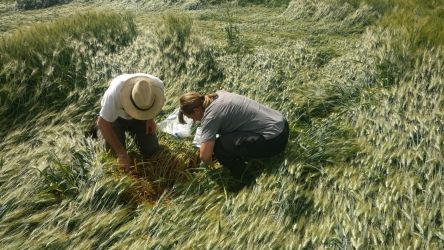Crop diversification and the reduction of chemical external inputs limit the environmental impact in agriculture by offering a possible solution to agro-climatic problems. This is the goal of the H2020 DIVERFARMING project which begins to draw its first conclusions a year and a half from the deadline.
Field experiments: In Italy, four pilot areas - characterized by different pedo-climatic conditions - have been selected. Three private farms are in the PoValley area (Northern Italy) and one experimental farm is in Apulia region (Southern Italy). Crop diversification is tested in all farm: in the typical Italian durum wheat / industrial tomato rotation, the crops have been increased by including legumes in the succession, such as industrial pea or field bean for green manure, and a short cycle tomato between two main crops. In addition, management innovations have been introduced with regard to tillage and nitrogen fertilization. Currently, the research team is working on evaluating the effects of diversification strategies on crop yield, soil organic matter conservation, greenhouse gas emissions reduction, nutrients dynamic and functional biodiversity of soils.
 Results: The results obtained seem to confirm the initial hypotheses: wheat and tomato generally showed higher crop yield under diversified systems compared to traditional rotation, even if the adverse weather condition observed in the second year, negatively affected industrial pea and tomato yields as multicrop. As regards greenhouse gases, the highest emissions were detected in autumn, after the spread of anaerobic digestate (natural fertilizer deriving from biogas production) and in summer for the cultivation of tomatoes following irrigation events.On the other hand, the reduction (-15%) of greenhouse gas emissions for tomato grown in rotation with wheat and field beans was significant, when subjected to a reduced irrigation regime (study conducted by Barilla). Also, the soil microbial community and biological fertility appear to be strongly influenced by management and diversification strategies. Finally, the analysis of the supply chain highlights a positive trend in economic indicators, on a multi-year basis, mitigating the effects of climatic and market instability on the gross margin compared to the current crop management.
Results: The results obtained seem to confirm the initial hypotheses: wheat and tomato generally showed higher crop yield under diversified systems compared to traditional rotation, even if the adverse weather condition observed in the second year, negatively affected industrial pea and tomato yields as multicrop. As regards greenhouse gases, the highest emissions were detected in autumn, after the spread of anaerobic digestate (natural fertilizer deriving from biogas production) and in summer for the cultivation of tomatoes following irrigation events.On the other hand, the reduction (-15%) of greenhouse gas emissions for tomato grown in rotation with wheat and field beans was significant, when subjected to a reduced irrigation regime (study conducted by Barilla). Also, the soil microbial community and biological fertility appear to be strongly influenced by management and diversification strategies. Finally, the analysis of the supply chain highlights a positive trend in economic indicators, on a multi-year basis, mitigating the effects of climatic and market instability on the gross margin compared to the current crop management.
DIVERFARMING is a five-year European project aimed at designing diversified cropping systems combined with low chemical input practices to increase crop productivity and reduce environmental impact. CREA is the leading partner for Italy and Nord-Mediterranean region with three Research Centers involved (i.e., Agricultural and Environment, Cereals and Industrial Crops, Genomic and Bioinformatic) to evaluate the effects of the diversified practices in different pedo-climatic conditions. Specifically, CREA evaluates the effects of crop diversification on the main physico-chemical, biological and microbiological parameters of the soil and on the greenhouse gas emissions. Also, the best management practices in terms of conservation of soil organic matter, increase of biodiversity, maintenance of soil fertility, and resilience of the agroecosystem (i.e., its ability to quickly respond to unexpected changes) are identified. The other Italian partners of the project are University of Tuscia, Barilla and Consorzio Casalasco.










